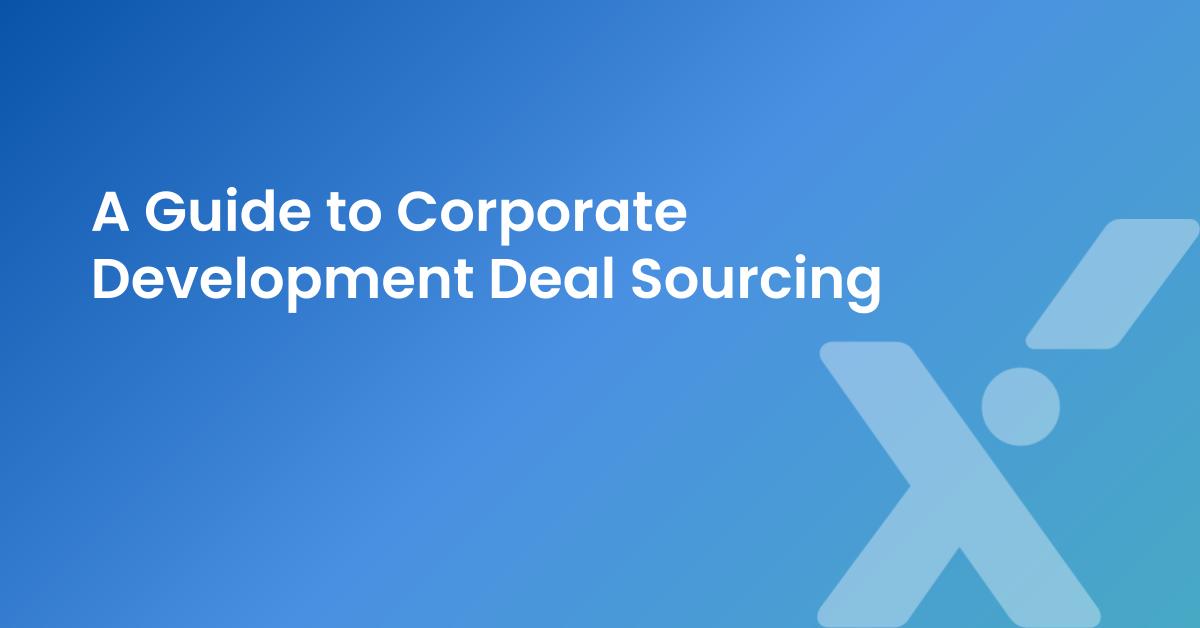A Guide to Corporate Development Deal Sourcing
Contrary to what one might expect, the role of corporate development teams extends far beyond merely finding and vetting new deal opportunities. Corporate development deal sourcing is pivotal for unlocking growth potential and driving business expansion. Success hinges on aligning strategy with objectives and effective deal sourcing.
But corporate deals have grown increasingly complex, and the due diligence process can often become disorganized and frantic. In this guide, we will comprehensively explore the elements of a successful corporate development deal flow, starting from the initial understanding on day one to various strategies for sourcing the right deals. We will also examine how leveraging an AI-deal sourcing platform can accelerate the process and help organizations seize potential deal opportunities.
Are you ready? Let’s dive in.
The Corporate Development Deal Flow
Corporate development process often involves transactions that enable a company to rebalance its portfolio and position itself for either growth or risk mitigation. The efficacy of a corporate development team rests on its ability to source and leverage the right deals. To give you an idea, here’s what a typical corporate development deal flow looks like.
A typical corporate development deal flow involves several stages and processes. Here is a general outline:
- Strategy and Opportunity Identification: The corporate development team works closely with the company’s leadership to identify strategic objectives and growth opportunities. This may involve analyzing market trends, competitive landscape, and potential areas for expansion.
- Deal Sourcing: The team actively seeks out potential proprietary deals and opportunities through various channels, such as industry contacts, investment banks, brokers, and networking events. They may also receive inbound inquiries from companies interested in partnerships or acquisitions.
- Initial Screening and Evaluation: The team conducts an initial assessment of potential opportunities to determine their fit with the company’s strategic objectives. This may involve evaluating financials, market potential, synergies, and risks associated with the opportunity.
- Due Diligence: If a potential opportunity passes the initial screening, a more detailed due diligence process is initiated. This involves a comprehensive analysis of the target company’s financials, operations, legal and regulatory compliance, intellectual property, customer base, and other relevant aspects.
- Valuation and Negotiation: Based on the findings from due diligence, the corporate development team determines the value of the target company and negotiates the terms of the deal. This includes discussions on price, payment structure, earn-outs, and other relevant terms.
- Deal Execution: Once the terms are agreed upon, the team works on finalizing the legal and contractual aspects of the deal. This involves drafting and reviewing legal documents, obtaining necessary approvals, and coordinating with external advisors, such as lawyers and investment bankers.
- Integration and Post-Merger Activities: After the deal is closed, the corporate development team plays a crucial role in integrating the acquired company into the existing operations. This may involve aligning cultures, integrating systems and processes, and realizing synergies identified during the due diligence phase.
Strategies for Corporate Development Deal Sourcing
Historically, advisors have been the largest source of deals. However, opportunities also arise when competitors’ transactions fall apart or when seasoned dealmakers rekindle old conversations with contacts. Because deal sourcing often involves multiple team members and diverse channels, finding unique opportunities can be challenging for deal origination teams and M&A leaders. Here are some strategies to help corporate development teams source better proprietary deals.
Inbound Inquiries
Companies often receive inbound inquiries from other companies interested in partnerships, joint ventures, or acquisitions. These inquiries can come from competitors, suppliers, customers, or other industry players. Corporate development teams actively engage with these inquiries and evaluate their potential.
Industry Networking
Building and maintaining a strong network within the industry is crucial for deal sourcing. Attending industry conferences, events, and trade shows provides opportunities to meet potential partners or target companies. Networking with industry professionals, investment bankers, and advisors can lead to valuable deal leads. In fact, corporate development teams often establish relationships with investment banks and brokers who specialize in M&A deals transactions. These intermediaries can provide access to a wide range of potential deals and assist in deal sourcing, due diligence, and negotiation.
Market Research and Analysis
Conducting thorough market research and analysis helps identify potential targets for partnerships or acquisitions. This involves monitoring industry trends, competitive landscape, and emerging technologies. By understanding market dynamics, companies can proactively seek out opportunities that align with their strategic objectives.
Targeted Outreach
Companies can proactively reach out to potential targets that align with their strategic objectives. This involves identifying companies that fit specific criteria, such as geographic location, market segment, or technology expertise. The corporate development team can then initiate discussions and explore potential opportunities.
Leverage New Tools
Increased competition means that corporate development deal sourcing teams need the most relevant information at their fingertips. Without new information, they cannot win, integrate, or even divest as profitably as they need to. Today, new technologies give you an edge over your competitors by providing instant access to sorted data, enabling you to identify potential acquisitions quicker and more accurately. In turn, this helps speed up the deal sourcing process.
Leveraging AI-Deal Sourcing Platforms for Corporate Development
For those looking to widen their scope of opportunities, AI-deal sourcing platforms like Cyndx Finder offer invaluable resources. These platforms use advanced AI and natural language processing technologies to analyze data from a myriad of sources, thereby helping organizations identify niche companies and potential deals.
Compared to traditional methods, AI-deal sourcing platforms provide access to a far broader range of opportunities, allowing organizations to stay updated on market trends and seize valuable chances. Cyndx Finder, for example, offers easy access to its extensive database of over 27 million companies, including 10 million mapped entities. It also provides interactive dashboards with real-time metrics and intuitive data visualizations, enabling organizations to make well-informed, timely decisions.
Curious how Cyndx does it? Request a demo, visit Cyndx Finder today.

